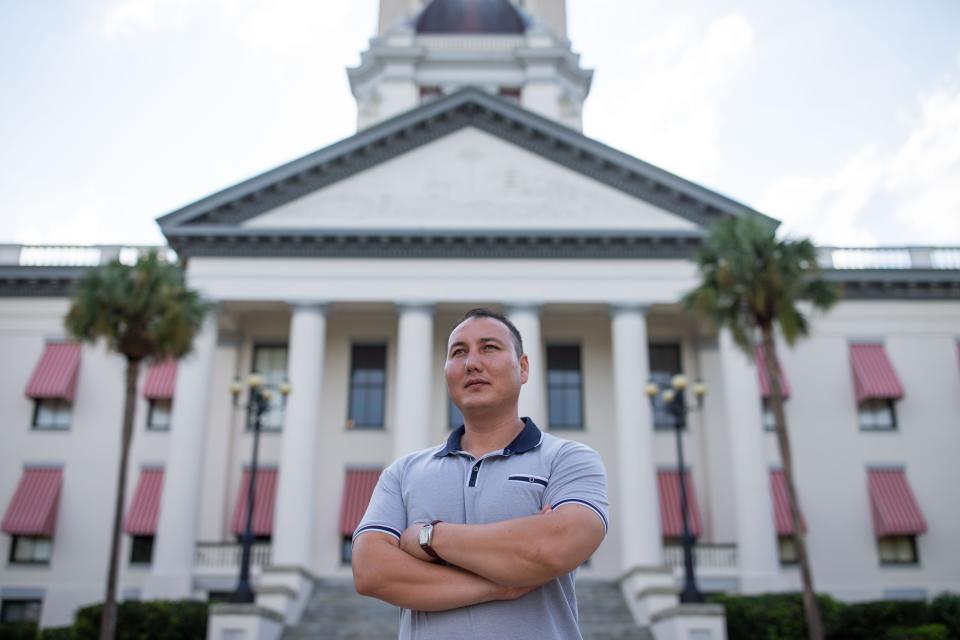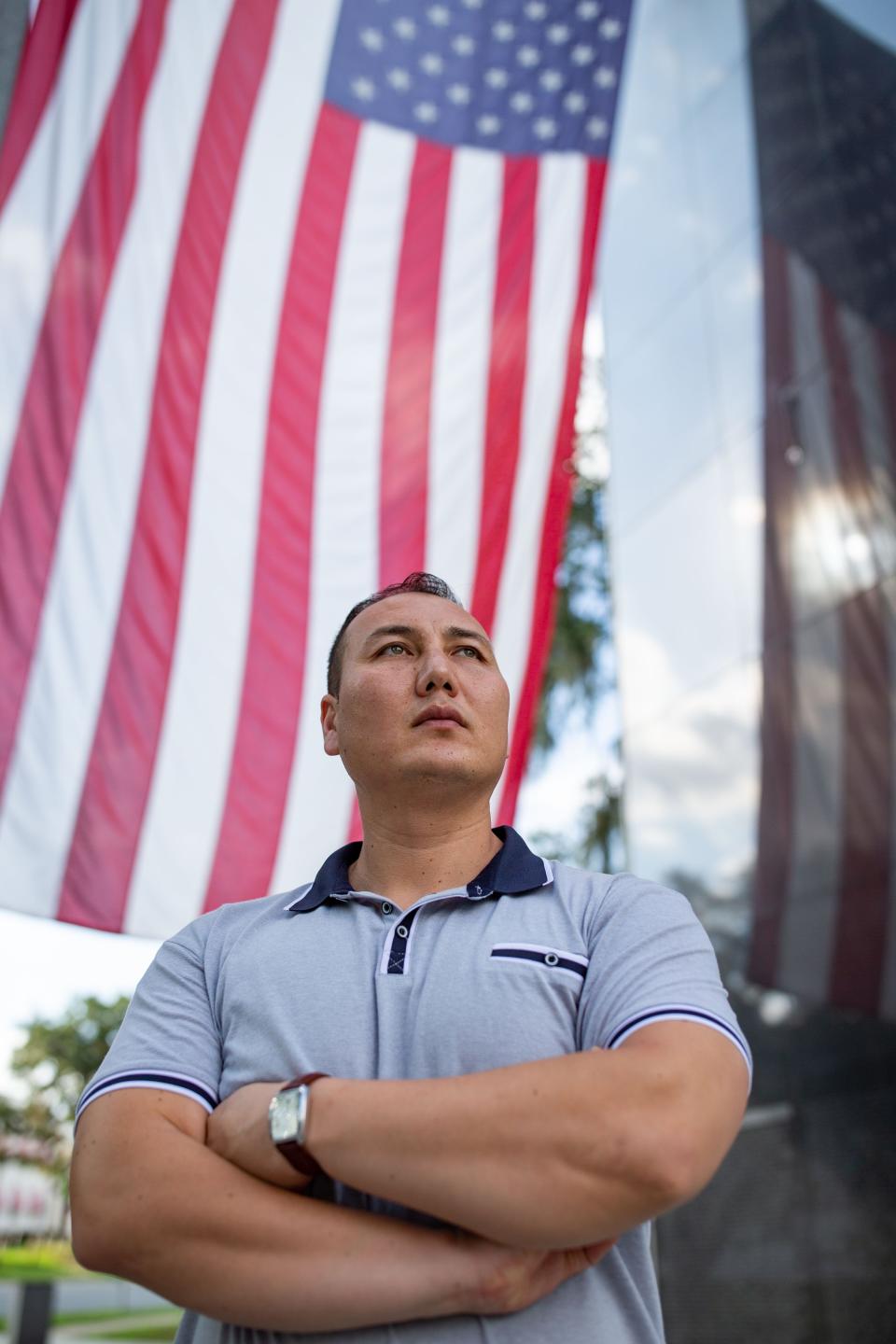He put his life on the line. Now a refugee in Tallahassee waits for his American Dream

All Dawood Sadiqi wants is the American Dream.
“I promised my daughter that I would take her somewhere which is not Afghanistan. She could wear whatever she wanted. She could practice whatever sport, she could dance, she could sing, she could learn music,” Sadiqi recalled from the moment he first held her in his arms.
But the hard truth is, all of this could soon disappear for Sadiqi and his family.
He, his wife and two young children were promised US citizenship due to the years Sadiqi risked his life as a translator for Americans during the war.
But his work license is set to expire this month. If his papers aren't processed, he will no longer be able to work as a project manager at North Highland, a consulting firm, and be unable to pursue any future career in the US.
This Tallahassee resident and thousands of other Afghan refugees are facing the same roadblock as they wait for the US government to approve their files.
Sadiqi had worked for eight years as a translator and project manager for the US. Amid growing talk of the withdrawal of American forces, Sadiqi expected an easy passage to the U.S. with his family.
In an instant, all of that changed.
"Scared for my life"
During the summer of 2021, the US under the leadership of President Joe Biden abruptly pulled its military forces out of the war zone as the Taliban closed in on the Afghan capital of Kabul.
At 11 a.m. on August 15, 2021, Sadiqi knew he had to dispose of his United States government issued pistol, armor and helmet.
Sadiqi went home to get his wife and two young children to a safer place, his brother’s house a few miles down the road.
As the Taliban breached the city, he knew it was only a matter of time before they would find his home and kill him and his family.
While serving as a translator for the US military, Sadiqi risked everything.
“Dawood did more for our country than 95% of Americans. And that's as a non-citizen. And without a green card, without an immigration card,” said Derek Whitis, who is a lobbyist Florida Power and Light Company, Polk State College Foundation, and several other companies.
He carried a device that could intercept conversations from phones and walkie-talkies. But the Taliban figured out that he and other translators were listening in on their conversations and ordered snipers to kill the translators first.
“I was feeling scared for my life,” he recalled. “If I am killed, who will take care of my family?”
Sadiqi put his life on the line for a country he dreamt of calling home one day.
“The biggest motivation was that after completing two years, I can have a special immigration visa and go to the US - provide a good and safe life for my family and children,” said Sadiqi.
While serving as a translator, Sadiqi was also privy to high profile, secret information.
When he got to his brother’s home that evening, he burned everything – disks, papers, badges – all of it for more than seven hours.
“It was so much that at some point the fire stopped burning because we kept putting lots and lots of paper and it stopped burning,” Sadiqi said. “When that paper stops burning, you realize the volume of all those sensitive documents.”
Next he had to bury his weapon and armor into a ditch somewhere in the pitch black of night.
He didn’t sleep that night.
“I was scared,” he said. “I could not sleep properly because I was constantly thinking that yes, they are coming for me.”
The process for being vetted as an Afghan refugee who had assisted Americans serving in the nearly 20-year war, was not a priority amid the chaotic withdrawal.
While temporary visas were emailed to Afghans who had worked for the US military, which included their family members, others found ways to print copies of the visas, causing the Kabul airport to be crowded with people begging to be put on a plane to safety.
Sadiqi and his wife packed two bags – one with diapers and baby clothes for their son who was six months old at the time and a bag of necessities . For Sadiqi, his wife and daughter, they only had the clothes on their backs when they finally caught a flight to safety.
The extensive travel was draining on the family.
They slept inside an airport for several days before flying to Qatar, where there were two portable toilets available for more than 500 people. Then they spent hours sitting on a tarmac in intense heat with no food or water before flying to Germany.
The C-17 was packed with 400 refugees seeking asylum in the US. They sat piled on top of one another until they landed.

After about a week in the freezing temperatures of Germany, Sadiqi and his family were brought to the states with hundreds of others.
"I have to take charge of my life"
When he arrived in Washington, D.C., he and his family took their first showers in weeks.
They were then loaded onto a bus to be taken to Fort Pickett in Virginia where they stayed for several months. The family had two sets of bunk beds in a bunker where they hung bed sheets to create some privacy for sleeping, as well as for Sadiqi’s wife to breastfeed.
Months later, on Dec. 22, 2021, he and his family were relocated to Tallahassee.
After all this time, Sadiqi's wife hadn't shed a tear − through all the airports, hours in extreme temperatures or even when the women and children were separated from the men.
The International Rescue Committee (IRC) had a home rented for the four of them near the Florida A&M University campus.
They had a couple of mattresses, a small sofa and water.
Sadiqi’s wife cried.
She was disheartened to see that her family wasn’t given what they were promised – after all the sacrifices they had made as a family for a country that wasn’t theirs until now.
As the family built a new life, Sadiqi knew he needed to provide for his family.
“I realized if I stayed here, nothing would happen. I have to take charge of my life,” said Sadiqi.
He posted on Nextdoor and described his qualifications − he has a master’s degree in business administration and can speak five languages − and asked if anyone had an old laptop he could use to apply for jobs.
Whitis saw Sadiqi’s request for help.
Whitis’ brother-in-law, who was a colonel in the Marine Corps, sent him a list of 10 questions for Sadiqi to answer in order to vet his identity.
Sadiqi provided all of the answers and more.

With that laptop and knowledge, he was able to secure a job.
"The rest is him making history for himself and his family," Whitis said.
Stuck in limbo
Sadiqi has been working as a project manager in Tallahassee ever since.
His family now rents an apartment in Southwood with plenty of space and all the amenities that they could ask for, and his daughter is receiving an education at the School of Arts and Sciences, taking ballet lessons and learning gymnastics.
But Sadiqi and his family are stuck in limbo while waiting for his papers to be approved so that he can continue to provide for his family.
Once he becomes a permanent resident he plans to move with his family to Washington, D.C., because there is more of a community of his people that reside there.
“At the peak, there were 170 families and individuals” who were transplanted to Tallahassee, he said. “Now there’s only 15 families because the rest of them left.”
The Tallahassee Democrat reached out to the International Rescue Committee multiple times for clarification on these numbers but did not receive a response.
He had friends who died on the front lines while helping the US. One was killed by an IED. Another lost his leg.
“There are thousands of examples like them. We are only a few of those examples that could reach here,” said Sadiqi. “We don't say compare us to the veterans, but we also did service to this country. We deserve respect."
Reach photojournalist Alicia Devine at adevine@tallahassee.com or on Twitter @alicia_c_devine. Check out her photos on Instagram @adevinephotography.
This article originally appeared on Tallahassee Democrat: Afghan refugee in Tallahassee in limbo as he waits for citizenship

